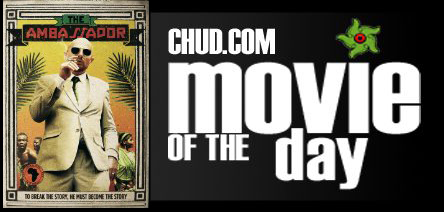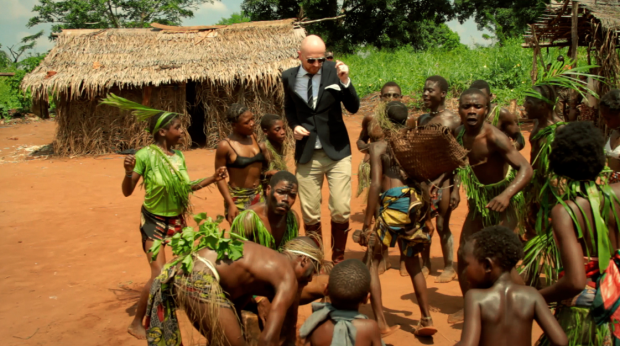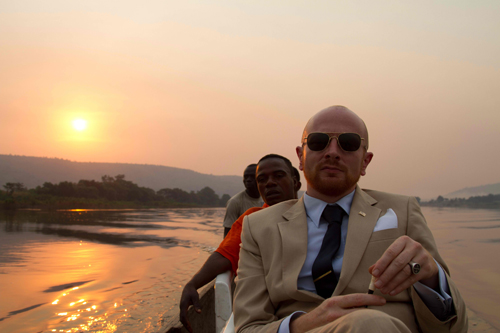
The Film: The Ambassador (2012)
The Principles: Mads Brügger – star and filmmaker.
The Premise: Armed with black-market diplomatic credentials, some cash, and phalanx of cameras (some hidden, some not), Danish journalist Mads Brügger goes undercover as a European consul in the dangerous and corrosively corrupt Central African Republic. Under the flimsy guise of building a matchstick factory, Brügger weaves his way through the underworld of slimy bureaucrats and opportunists who run the country, crossing paths with blood diamond smuggling, bribery, and even murder.

Is It Good: Yes. It even flirts promiscuously with greatness. In fact, The Ambassador’s biggest failing is that for a while it seems like we may be watching a documentary masterpiece on par with Michael Moore’s groundbreaking Roger & Me, but as the film enters its third act it starts losing its footing and seems to climax because it has reached an appropriate ‘feature-length’ more so than because it has reached its conclusion.
Brügger isn’t exactly blowing any whistles here. Let’s be honest with ourselves: you probably don’t care or think much about the Central African Republic. You possibly didn’t even know that it was a country before right now. But as its name should indicate, it is in central Africa, so regardless you’d still probably assume that it is a violent, corrupt, and impoverished nation. The strength of Brügger’s exposé isn’t that he’s showing us something we were unaware of, but that he’s showing us how it happens. Furthermore, he’s not just showing us in a Michael Moore tenacious-man-on-the-street way. Brügger, who won the World Cinema Jury Prize: Documentary at the 2010 Sundance Film Festival for Red Chapel, takes the full-on Sacha Baron Cohen approach. The comedy and entertainment value of The Ambassador comes from the fact that Brügger isn’t just portraying a European diplomat, he’s portraying a caricature of a European diplomat. He looks like a dorky white guy dressed up as the rapper Pitbull for Halloween, and throughout the film he sports a variety of tobacco products, never seen without his silly cigarette holder, or awkwardly smoking a cigar or a pipe.

Like Borat, the fact that people actually buy this ridiculous character only deepens the comedy and the film’s commentary. No one ever questions Brügger, not even the fellow European who sold Brügger forged diplomatic material (who Brügger routinely calls with problems throughout the film). This goes a long way to highlight how shitty CAR’s whole system is, because it means that the real assholes who buy diplomatic papers in order to exploit the country apparently aren’t any less absurd than Brügger is acting. This is how the Africans must expect rich Europeans to be. When Brügger proclaims that he wants his matchstick factory to employ only Pygmies (from the Pygmy tribe), and to be advertised as “Made By Pygmies,” so it shall be. And because Brügger’s character is clearly corrupt, no one puts up much pretense around him. This is the film’s most damning presentation. Brügger barely seems to be trying. He is simply tapping into a corrupt system. Rich white businessmen pretend to be diplomats all the time in CAR, so there isn’t much need to “fool” anyone. No one actually cares as long as they’re getting paid; complacent in the assumption that nobody gives enough of a shit about CAR to do what Brügger is doing.
But as funny as Brügger is, and as fascinating as it is to see so intimately behind this curtain of corruption, it eventually becomes clear that The Ambassador is a film in pursuit of a narrative. While there is editing and artistry involved, crafting a truly brilliant documentary out contemporaneous events is mostly left to the fates. How can a filmmaker know if ‘life’ will provide a satisfying Hollywood ending when embarking on a production? This, of course, is the reason why reality TV is about 40% reality (and that’s a kind estimate). I’m happy Brügger didn’t try to fake anything monumental just to give the film a story, but at the end of the day The Ambassador isn’t a Rolling Stone article or 60 Minutes piece, it is a movie. And it is a movie intentionally presenting itself as entertainment. As an experiment in gonzo journalism, it proves a fun romp, but after a flashy and thrilling beginning, the film ends with a small thud. Brügger couldn’t control that, and pushing things further could have gotten him killed or arrested. But this is where some more astute filmmaking could have come in handy. Though Brügger speaks freely with us in narration, explaining that he is a journalist, as far as what we see on camera the movie plays out almost entirely straight, like Borat. But Borat was a prank on the American people. If that’s all The Ambassador is, then there is little reason to watch — it isn’t exactly knee-slappingly hilarious to see a poor Pygmy tribe duped into thinking they’ll be employed in a matchstick factory. Brügger has more on his mind than that. So I’m not entirely sure why we, the audience, are kept at arms length. The real story here is Brügger making the movie, not the movie itself. We never see him drop his consul character, or work on his schemes with his crew — there is a white translator that we repeatedly see in the film, but I never gleaned if she was in on the gag or not. This approach possibly could have been an advantage if the film had more of a through-line narrative. But it doesn’t.

Is It Worth A Look: If you’re into this sort of documentary, most definitely. It has the light air of a Morgan Spurlock film, but with the weight of actual danger and substance. I can’t say you’ll gain any new insight on the world, but it is funny and awkward and very damning.
Random Anecdote: According to Liberia’s The Daily Observer: “Presidential Press Secretary Jerolinmick Z. Piah said the issue is of grave concern to the President, and she has called for a full investigation. …The Government of Liberia said Mr. Cortzen’s [full name is Mads Brügger Cortzen] action was not only immoral but criminal and offensive to the Government and people of Liberia. In a documentary, Cortzen said his motive was going undercover to explore the nefarious world of blood diamonds and corruption in Africa.”